A skincare routine is a series of steps you follow every day to keep your skin healthy. It’s a daily ritual for your skin, providing it with the care it needs. A proper routine can help prevent issues, promote balance, and maintain a glowing complexion.
If you’re new to the idea of a skincare routine, you’re in the right place. This guide will show you the essentials and help you understand why establishing a daily skincare routine is crucial.

Source: vaibhavstores.in
Contents
Understanding Your Skin Type
Before buying products, it’s essential to know your skin type. This knowledge forms the basis for selecting the best products for your skin. Your skin could be normal, oily, dry, or a combination of these. Each type requires specific care to address its unique needs.
How to Identify Your Skin Type
Observing how your skin feels throughout the day can provide valuable insights. If you’re unsure, consider consulting a dermatologist. They can assess your skin type and recommend suitable products tailored to your needs.
Essential Steps in a Skincare Routine
Now that you understand your skin type, it’s time to create a basic but well-rounded skincare routine.

Source: goodhousekeeping.com
Cleansing
Cleansing is the first step in your routine, and it removes dirt, oil, and impurities from your skin, keeping it fresh and clean.
Select a cleanser that matches your skin type. For example, gel cleansers work well for oily skin, while cream cleansers are great for dry skin.
Toning
Toning helps balance your skin’s pH levels and prepares it for the next steps in your routine, ensuring optimal product absorption.
Look for a toner with soothing ingredients that match your skin type. Avoid toners with alcohol, as they can be harsh and strip your skin of its natural oils.
Moisturizing
Moisturizing is crucial for all skin types. It keeps your skin hydrated, preventing dryness and maintaining a healthy barrier.
Choose a moisturizer that suits your skin type. If you have oily skin, go for a lightweight, oil-free moisturizer, while those with dry skin may benefit from a richer, hydrating formula.
Sunscreen
Sunscreen is your skin’s shield against harmful UV rays. It prevents sun damage and premature aging and lowers skin cancer risk.
Opt for a broad-spectrum sunscreen with at least SPF 30. Make sure it suits your skin type, whether it’s a gel, cream, or spray.

Source: medium.com
Additional Steps for Advanced Skincare
After making the basic foundation of your skincare routine, next are the most advanced steps, which include:
Exfoliation
Exfoliating removes dead skin cells, promoting cell turnover and leaving your skin radiant. It can also prevent clogged pores and breakouts.
Choose between physical (scrubs) and chemical exfoliants (acids). Start with once a week and adjust based on your skin’s response.
Serums and Treatment Products
Serums are concentrated products targeting specific skin concerns, such as hydration, brightening, or anti-aging.
Identify your skin concerns and choose serums or treatments accordingly. For instance, if you have dark spots, look for a serum with vitamin C.
Creating Your Customized Skincare Routine
Now that you’re familiar with the foundational steps, here’s how you can customize your skincare routine based on your lifestyle:

Source: forbesimg.com
Daily Morning Routine
- Morning Cleansing: Start your day with a gentle cleanse to remove impurities.
- Applying Toner: Balance your skin’s pH and prep it for the day ahead.
- Using Treatment Products (if applicable): Apply serums or treatment products targeting your specific needs.
- Moisturizing: Hydrate your skin with a suitable moisturizer.
- Applying Sunscreen: Protect your skin from UV rays with a broad-spectrum sunscreen.
Nightly Skincare Routine
- Evening Cleansing: Remove makeup and cleanse to get rid of the day’s impurities.
- Toning Before Bed: Restore your skin’s balance before applying night treatments.
- Treatment Products for Nighttime: Use products with ingredients like retinol for night repair.
- Night Moisturizing: Hydrate your skin again before bedtime.
Common Skincare Issues
Experiment with different products, but introduce them one at a time to identify what works best for your skin. This is very important, especially if your skin is sensitive. Here are some common issues to watch out for when trying new products:

Source: privatelabelskincareflorida
Allergic Reactions
Watch out for redness, itching, or swelling. If you notice these signs, stop using the product immediately. Switch to products with minimal ingredients or those designed for sensitive skin. Patch-testing new products can help avoid adverse reactions.
Breakouts
Breakouts can result from various factors, such as clogged pores or hormonal changes. Incorporate products with salicylic acid or benzoyl peroxide. Avoid heavy, pore-clogging products.
Dryness or Oiliness
For dry skin, use a richer moisturizer. For oily skin, opt for oil-free, hydrating products to maintain balance.
Incorporating Skincare Tips from Experts
Dermatologists are medical professionals specializing in skin health. Seeking their guidance provides personalized advice tailored to your skin’s specific needs. Dermatologists can identify your skin type, diagnose any existing issues, and recommend products or treatments suitable for your unique concerns.
While professional advice is crucial, exploring reliable sources and testimonials from individuals with similar skin concerns is valuable. Online platforms, skincare blogs, and reputable magazines often feature insights from skincare enthusiasts or professionals
However, be cautious about anecdotal advice. While anecdotal advice can be informative, it’s essential to approach it with caution. Anecdotal advice is based on personal experiences, which may not be universally applicable. What works for one person may not work for another, as individual skin types, concerns, and reactions to products vary.

Source: shutterstock.com
Building Consistency and Tracking Progress
Consistency is key to seeing results, so stick to your routine for at least a few weeks before expecting significant changes. Maintain a simple journal to track products, routines, and any changes in your skin. This can help identify what works best for you. As your skin changes or seasons shift, be flexible with your routine. Adjustments may be necessary for optimal results.
Start Your Daily Skincare Routine Today!
Remember, a skincare routine doesn’t need to be complicated. Focus on the basics: cleanse, tone, moisturize, and protect. Trust the process, and don’t be discouraged if results aren’t immediate. A well-crafted skincare routine is an investment in the long-term health and appearance of your skin.
When establishing your skincare routine, consider reputable brands like Dermalogica Australia for high-quality products tailored to various skin needs.
